BUDDHISTDOOR IN ENGLISH
You can read part four of this article here
Title: The Lost World of Tibet
Director: Emma Hindley
Year: 2007
Country: United Kingdom
Language: English
Genre: documentary
Duration: 1 hour and 30 minutes
Tradition: Tibetan Buddhism
Subject: history
Synopsis: Presents previously unpublished archival color footage from 1940s and 1950s Tibet, showing life in the Himalayan kingdom. The footage, which includes religious ceremonies and scenes of daily life, is annotated by the current Dalai Lama, who offers his recollections of that era.
----------------------
Title: The Medicine Buddha
Director: Benjamin D. Johns
Year: 2019
Country: Mongolia
Language: Mongolian
Genre: documentary
Duration: 1 hour and 50 minutes
Tradition: Tibetan Buddhism
Subject: Mongolian Buddhism
Synopsis: This documentary, narrated by Academy Award winner Sir Ben Kingsley, is a cinematic portrait of the renowned Mongolian Buddhist leader, Khamba Lama Natsagdorj. Faith and science are reconciled as we immerse ourselves in the Lama's tireless humanitarian efforts. The film is a valuable introduction to Mongolia's rich cultural and religious heritage, customs and daily life. It also touches on Buddhist philosophy and local traditional medicine.
-----------------------
Title: The Mindful Revolution
Director: Samuel Stefan
Year: 2015
Country: USA
Language: English
Genre: documentary
Duration: 59 minutes
Topic: mindfulness meditation
Synopsis: The transformation that mindfulness meditation has brought to the business world, a critical examination that reveals what lies behind the facade of this modern spiritual phenomenon. This analysis seeks to unravel how this practice, which has become popular in the corporate world, is influencing work and personal dynamics, and what implications it has beyond its superficial appearance.
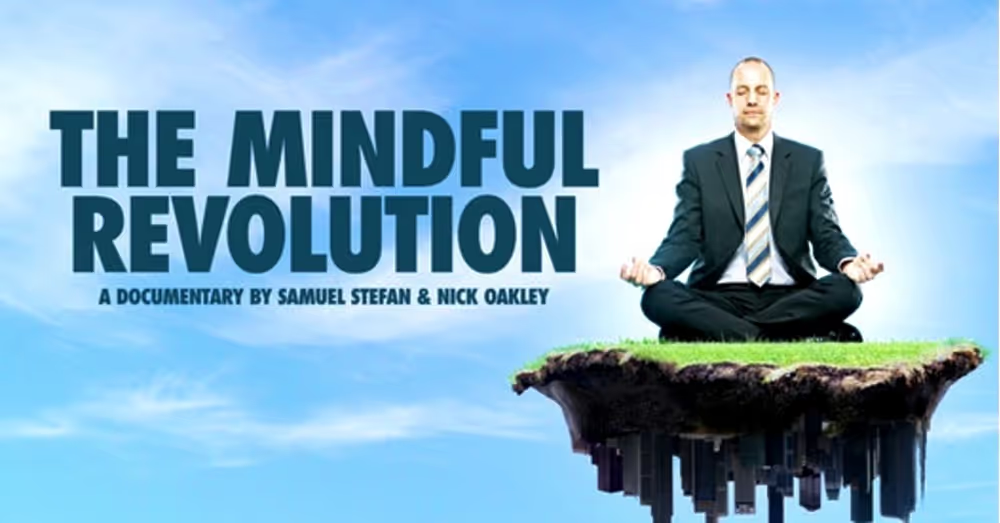
Title: The Monk ("El Monje ")
Director: Maw Naing Aung
Year: 2014
Country: Myanmar
Language: Burmese
Genre: documentary
Duration: 1 hour 33 minutes
Tradition: Theravada Buddhism
Subject matter: internal conflict in the context of religious traditions and social changes.
Synopsis: Zawana, a teenager raised in a remote Burmese monastery by the strict abbot U Dahma, faces a crucial decision about his future. He must choose between staying to care for Dahma, joining another novice who seeks a more lenient monastery in the city, or pursuing a relationship with a village girl who moves to Rangoon. This film explores Zawana's internal struggle, reflecting broader social changes in Burma.
-----------------------
Title: The Next Guardian
Director: Arun Bhattarai, Dorottya Zurbó
Year: 2017
Country: Bhutan
Language: dzongkha
Genre: documentary
Duration: 1 hour 15 minutes
Tradition: Tibetan Buddhism
Theme: clash between tradition and individual aspirations.
Synopsis: 13-year-old Tashi has only one desire: to excel, either as a soccer player or as the future guardian of his family's monastery in Bhutan. In this context, the dreams of two generations collide in the microcosm of an ancient Buddhist monastery in Bhutan, when Gyembo, an ordinary teenager, is chosen by his father to be the next guardian of the family monastery.

Title: The Practice of the Wild
Director: John J. Healey
Year: 2010
Country: USA
Language: English
Genre: documentary
Duration: 53 minutes
Tradition: Zen Buddhism
Theme: Reflections on interconnections between ecology and Zen Buddhism
Synopsis: This portrait of beat poet Gary Snyder highlights his connection to nature and the power of literature. It combines the bohemian life of the San Francisco Bay Area, Zen Buddhism, and reflections on ecology and spirituality, with the precision of a well-crafted stanza.
------------------------
Title: The Tibetan Book of the Dead 1 & 2
Directors: Yukari Hayashi, Barrie McLean
Year: 1994
Country: Canada
Language: English
Genre: documentary
Duration: 46 minutes (part 1) and 45 minutes (part 2)
Tradition: Tibetan Buddhism
Subject: teachings and practices related to "The Tibetan Book of the Dead".
Synopsis: This two-part documentary, narrated by Leonard Cohen, explores "The Tibetan Book of the Dead," an ancient spiritual guide from the Himalayas. The first part, "A Way of Life," investigates the book's history, its application in India and its acceptance in the West, including interviews and rituals with the Dalai Lama. The second part, "The Great Liberation," follows a lama and a young monk as they guide a deceased person into the afterlife, showing Tibetan beliefs about the state of "bardo" after death.
-----------------------
Title: Le Vénérable W ("The Venerable W")
Director: Barbet Schoeder
Year: 2017
Country: France
Language: French
Genre: documentary
Duration: 1 hour 47 minutes
Tradition: Tibetan Buddhism
Subject: Tensions between Muslims and Buddhists in Myanmar.
Synopsis: A look at the religious tensions between Muslims and Buddhists through the portrait of Buddhist monk Ashin Wirathu, who leads the anti-Muslim movement in Myanmar.
------------------------
Title: The Yamaguchi story Buddhism and the family in contemporary Japan
Director: Jamie Hubbard
Year: 2009
Country: Japan
Language: Japanese
Genre: documentary
Duration: 48 minutes
Tradition: Buddhism
Theme: Exploration of Buddhism in contemporary Japan
Synopsis: This is a documentary about a Tokyo family discovering the Buddhist tradition. The film explores modern Buddhism in Japan, encouraging discussions of doctrine, practice and institutions. Although it focuses on the current state of Buddhism, it shows only some facets of its diversity in contemporary Japanese society.
-----------------------
Title: The Yogis of Tibet
Director: Jeffrey M. Pill
Year: 2002
Country: USA
Language: English
Genre: documentary
Duration: 1 hour and 17 minutes
Tradition: Tibetan Buddhism
Thematic: discovery and revelation of Tibetan culture to the Western world.
Synopsis: For the first time, Tibetan monks have agreed to share their philosophy and allow their ancestral practices to be filmed. Tibet, long shrouded in myth and isolated from the world, was a mystery to the West. When Western explorers entered Tibet in the late 19th century, they brought with them images that fueled stories of a mythical Shangri-La, a peaceful land ruled by compassion and free of conflict.
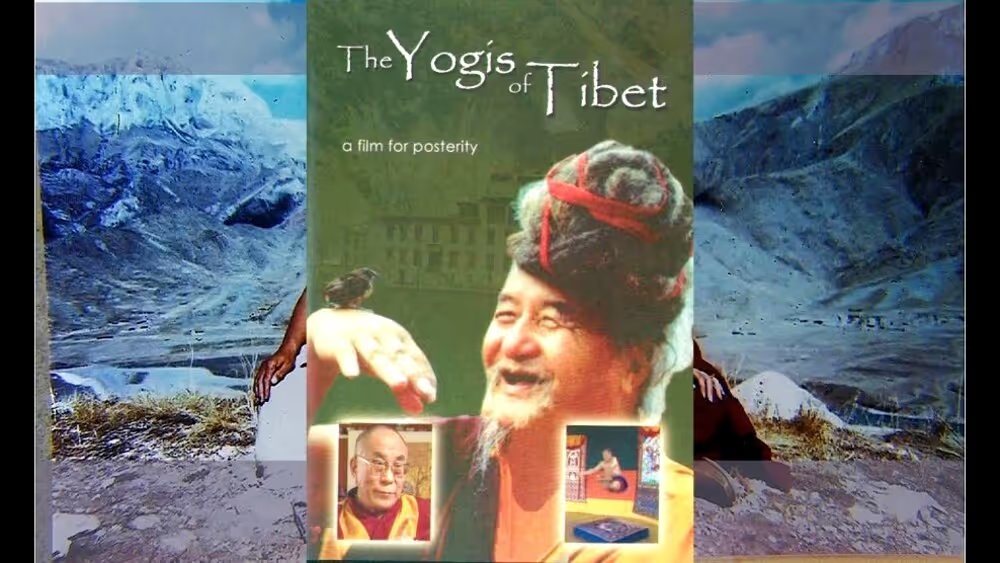
Title: "Travellers and Magicians
Director: Khyentse Norbu
Year: 2003
Country: Bhutan
Language: dzongkha
Genre: drama
Length: 108 minutes
Tradition: Tibetan Buddhism
Theme: the conflict between personal aspirations and limiting circumstances,
Synopsis: The story follows Tshewang Dendup, a government official dissatisfied with his job in a remote area, who dreams of moving to the United States. He has heard that there one can earn more money picking fruit in a day than he earns in a month back home. A friend living in New York has promised to help him, but he needs to get there before an approaching deadline. On his way to Thimphu, the capital, he misses the only public transportation available that week. While waiting for another vehicle to pass, he overhears a monk telling stories about magic and travel.
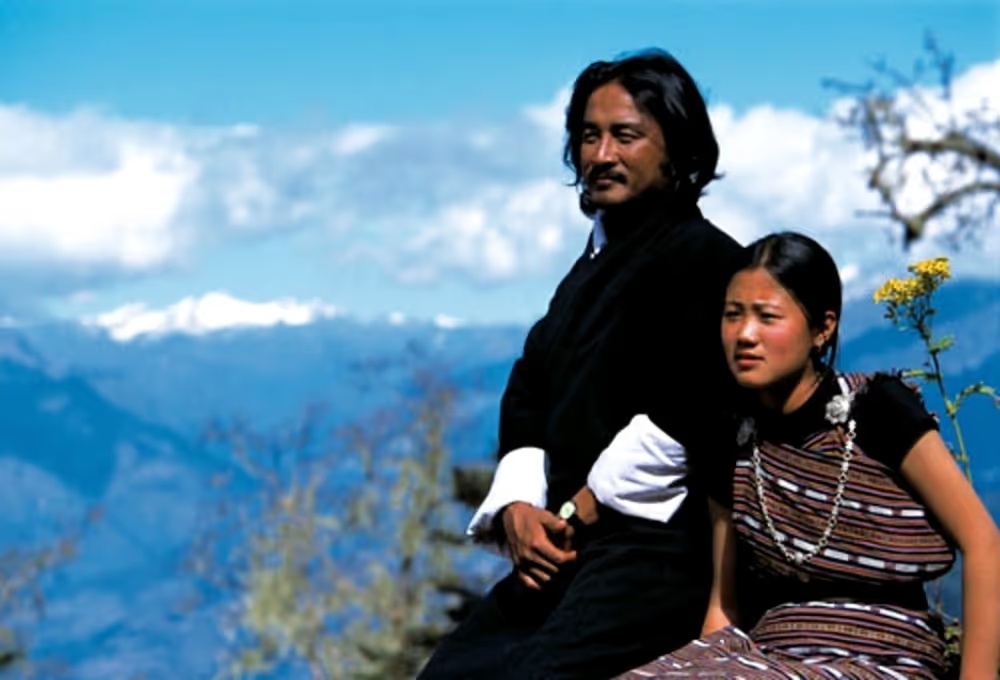
Title: Tulku
Director: Gesar Mukpo
Year: 2009
Country: Canada
Language: English
Genre: documentary
Duration: 75 minutes
Tradition: Tibetan Buddhism
Theme: identity and culture shock.
Synopsis: The film examines Tibetan masters called "tulkus", recognized as reincarnated Buddhas. Since the 1970s, some tulkus have been born in the West, leading them to face culture shock and identity confusion. These tulkus must balance their spiritual heritage with modern life, facing unique challenges in the process.
------------------------
Title: A Buddha
Director: Diego Rafecas
Year: 2005
Country: Argentina
Language: Spanish
Genre: drama
Duration: 1 hour 55 minutes
Tradition: Zen Buddhism
Thematic: The conflict between modern life and spiritual quest
Synopsis: The story revolves around a city boy who persistently shies away from his deepest existential crisis: the desperate need to find his authentic self. Life's setbacks, including disappointments and painful events, lead him inexorably into the world of severe asceticism. His radical transformation involves the total abandonment of his previous life, including his personal relationships and eating habits, which has a dramatic impact on the people in his closest circle.
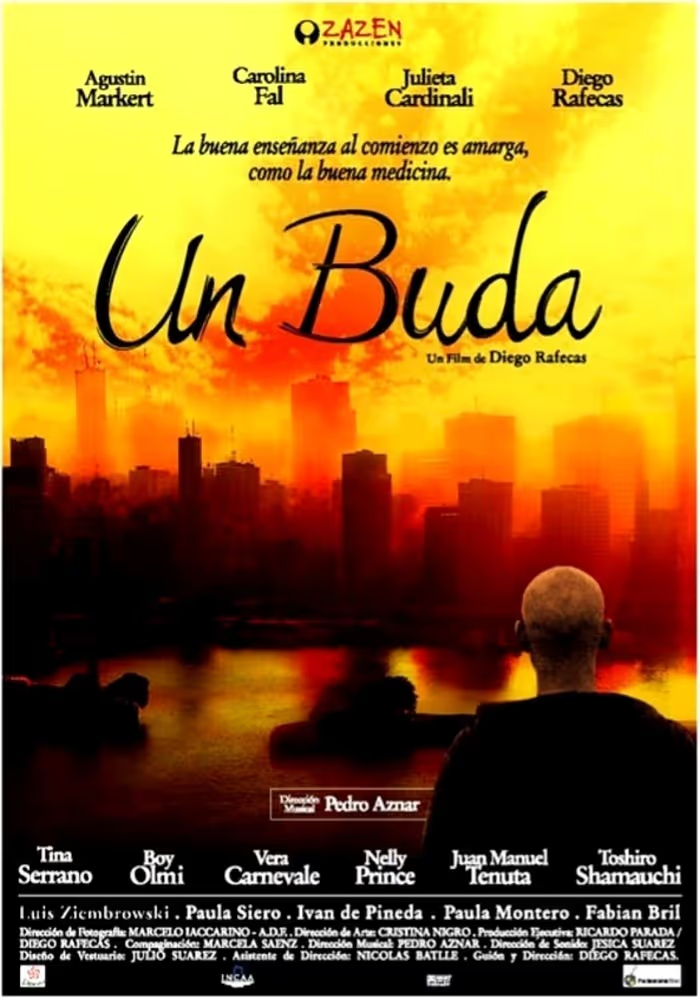
Title: Unmistaken Child ("El Niño Inconfundible")
Director: Nati Baratz
Year: 2008
Country: Israel
Language: Tibetan
Genre: documentary
Length: 102 minutes
Tradition: Tibetan Buddhism
Thematic: explores faith, tradition and the master-disciple bond in Tibetan Buddhism.
Synopsis: A Tibetan Buddhist monk embarks on a four-year quest to find the reincarnation of his late master Lama Konchog. The documentary follows the physical and spiritual journey of the monk Tenzin Zopa as he searches for the child who could be the reincarnation of his master.
-----------------------
Title: Valley of Flowers
Director: Pan Nalin
Year: 2006
Country: India
Language: Hindi
Genre: drama
Length: 155 minutes
Tradition: Buddhism
Theme: Spirituality
Synopsis: An epic love story that spans centuries, about a bandit and a martial arts master whose romance unfolds in the Himalayas. The narrative explores themes of love, karma and the nature of existence across multiple lifetimes.
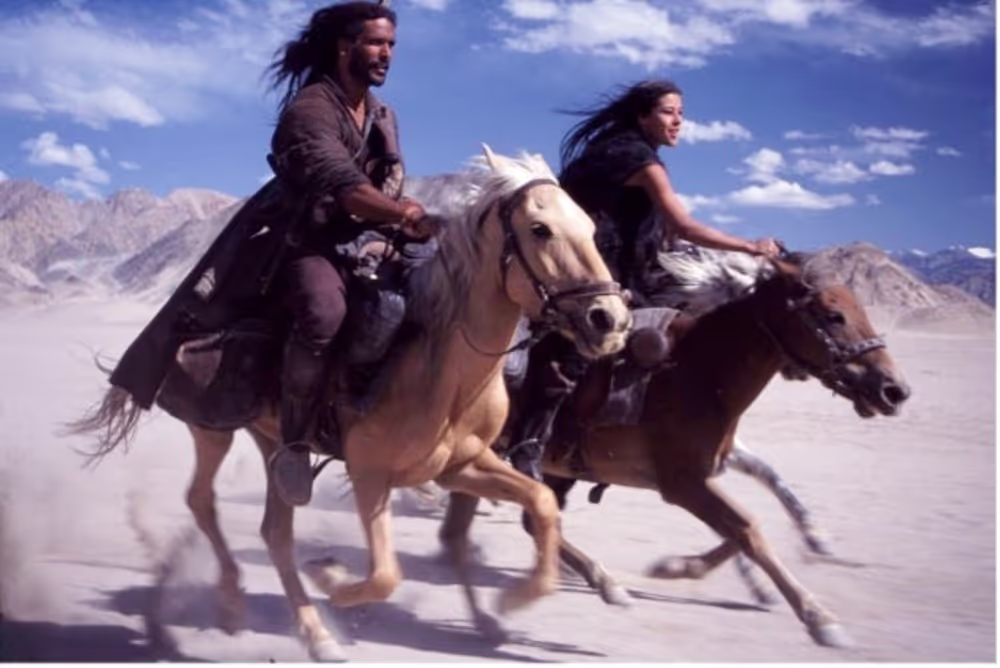
Title: Vara: The Blessing ("Vara: The Blessing")
Director: Khyentse Norbu
Year: 2013
Country: Bhutan
Language: dzongkha
Genre: drama
Duration: 1 hour and 36 minutes
Tradition: Buddhism
Theme: Spirituality
Synopsis: In rural India, Lila and her mother Vinata, a temple dancer consecrated to a Hindu god, live on the margins and in poverty. Lila's life takes a turn when Shyam, a young low-caste sculptor, asks her to be his model. Despite the risk this poses for both of them due to strict social and religious norms, Lila accepts, developing between them a story of forbidden love that brings spiritual devotion into conflict with the desires of the heart.
-----------------------
Title: Why Has Bodhi Dharma Left for the East?
Director: Bae Yongkyun
Year: 1989
Country: South Korea
Language: Korean
Genre: drama
Length: 175 minutes
Tradition: Zen Buddhism
Subject: Buddhism
Synopsis: The film follows the lives of three Zen monks in a remote mountain temple: an elderly master, an adult monk and a young novice. Through their interaction, the film deeply explores the principles of Zen Buddhism and the quest for enlightenment.
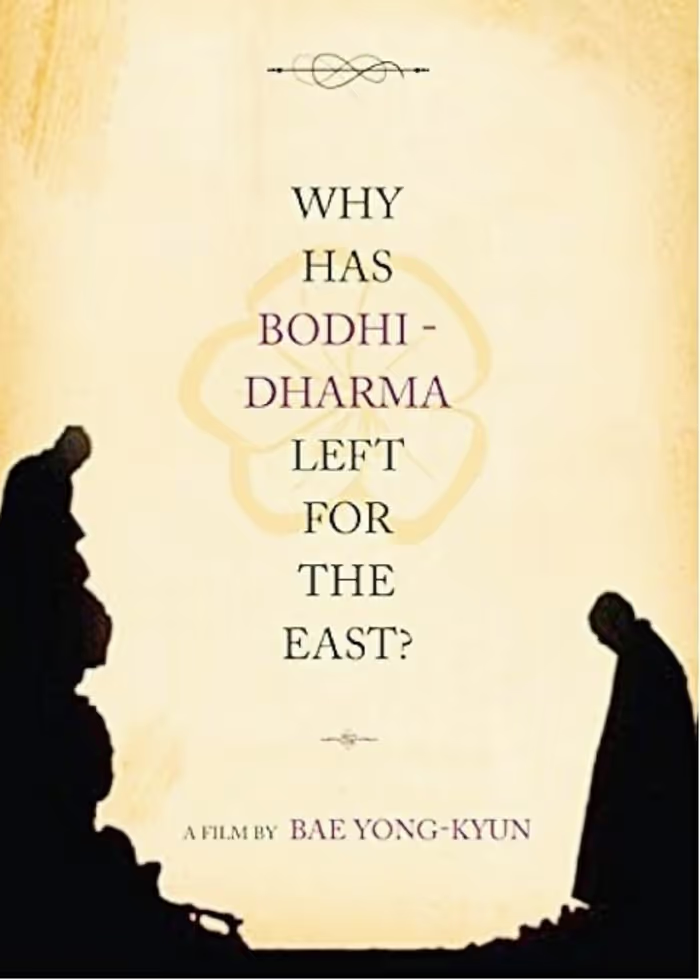
Title: Windhorse ("Windhorse")
Director: Paul Wagner
Year: 1998
Country: USA
Language: English, Tibetan
Genre: drama
Length: 97 minutes
Tradition: Tibetan Buddhism
Subject: Human rights
Synopsis: In a remote Tibetan Himalayan village, three cousins - Dorjee, her sister Dolkar and Pema - witness the murder of their grandfather by Chinese soldiers. Years later, in Lhasa, their lives have taken different paths: Dolkar becomes a pop singer and embraces Chinese culture, Dorjee develops a deep hatred for the Chinese government, and Pema becomes a Buddhist nun. Their fates cross again when Pema is arrested for participating in protests against the Chinese government, which draws their cousins into the dangerous world of Tibetan resistance.
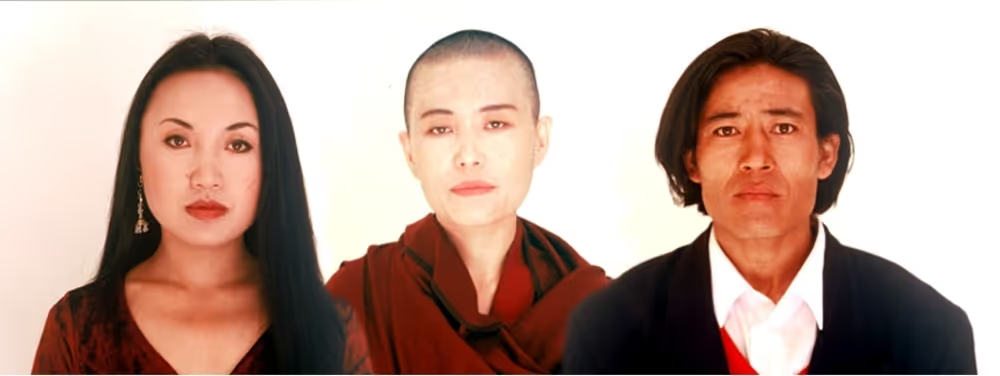
Title: Zen ("Zen")
Director: Banmei Takahashi
Year: 2009
Country: Japan
Language: Japanese
Genre: drama
Length: 127 minutes
Tradition: Zen Buddhism
Subject: dramatic biography of Zen master Dogen,
Synopsis: A dramatic biography of Zen master Dogen, founder of the Soto Zen school in Japan. The film follows his journey to China in search of the true dharma and his subsequent efforts to establish Zen Buddhism in Japan during the 13th century.







